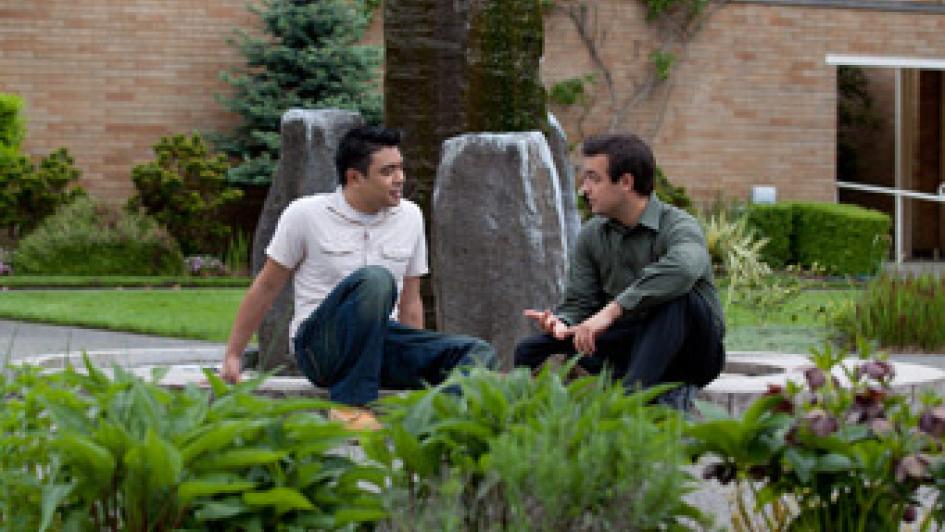New Master's Program Offers Holistic Approach to Counseling Psychology

Published
Studying the health of the mind is nothing new at Bastyr University, but now there's a new graduate degree program for it. The University is launching a Master of Arts in Counseling Psychology program in fall 2012, opening new career options in a field expected to see strong growth.
The two-year program provides the academic requirements leading graduates toward becoming licensed mental health counselors (LMHCs). The program uses the University's distinctive integrated approach to mental, spiritual and physical wellness. That asset convinced leaders it was time to offer a master's-level counseling degree.
"The holistic model is what put us on the map as an institution," says Department of Counseling and Health Psychology Chair Charles Smith, PhD, who is also director of the new program.
Bastyr's counseling faculty members already teach students of naturopathic medicine and other programs, ensuring mental health is part of their education. (The department also offers an undergraduate degree.)
"Much of psychology is focused purely on what is the matter with people," says Dr. Smith. "Counseling psychology has a broader range that includes issues of well-being, wellness and normality. While we will train people to understand psychopathology, we're also training them to look at the whole person."
The program is also unique for including a spiritual element. While it doesn't embrace particular religions, it includes techniques such as mindfulness and meditation. That element appeals to Angie Ibach, a senior in Bastyr’s Bachelor of Science in Health Psychology program who is considering applying to the new master’s program.
"I think it's necessary, as a future practitioner, to take in all aspects of the person," she says. "You can't treat just the mind or just the body or spirit and expect somebody to make progress. Not all other psychology programs touch on that spiritual aspect."
Integrative Training
The program includes coursework in complementary and alternative medicine, multiculturalism, social justice and other nontraditional subjects (see the full curriculum). The curriculum also emphasizes hands-on training. In their first summer, students begin clinical training under faculty supervision at Bastyr Center for Natural Health, the University's teaching clinic. The next year they begin counseling internships that help them meet state licensing requirements for training hours.
The holistic perspective will be clear throughout, Dr. Smith says. In the classroom, students will learn about anatomical development (how a 17-year-old's brain is different from a 70-year-old's, for instance). In counseling rooms, they'll work with nearby naturopathic doctors, nutritionists and acupuncturists to whom they can refer patients.
"The integrated approach is a lens for looking at people in a developmental way," Dr. Smith says. "We learn to hold in front of us the lens of what a person's potential is, what a healthy human being looks like, what an individual could look like if they make a few life changes."
Students in other programs at the University, such as naturopathic medicine, also may want to enroll in the counseling psychology program to gain additional tools for their practice. The University expects an inaugural class of 10, with larger classes in the following years.
Need for Counselors Locally, Nationally
Classes will take place Saturdays and Sundays, in hopes the program will be accessible to both recent graduates and professional workers considering a change of careers. That should bring a breadth of work and life experience that enriches the entire University, says President Daniel K. Church.
"This can increase the diversity of what our students come to study and the diversity of their backgrounds," he says. "That will only help us."
All 39 counties in Washington state are experiencing shortages in mental health services, suggesting a h3 need for licensed counselors. Nationwide, the Bureau of Labor Statistics estimates a 24 percent growth rate in mental health counseling between 2008 and 2018.
Ibach says studying psychology at Bastyr as an undergraduate convinced her she wants to gain more skills in counseling. Now she's eager for clinical training to help her hone in on the type of career she wants.
"I'm chomping at the bit when it comes to getting clinical experience," she says. "I think that will really help me figure out what I want to do. My current plan is to have a private practice, but I'm finding that it changes often because I'm being introduced to new ideas at a rapid rate."
That plan may include integration with physical health practitioners, she says: "I used to think of psychology as just correlated with the mind. It's so much bigger than that."
For more information about the Master of Arts in Counseling Psychology, please contact [email protected] or 425.602.3330.

